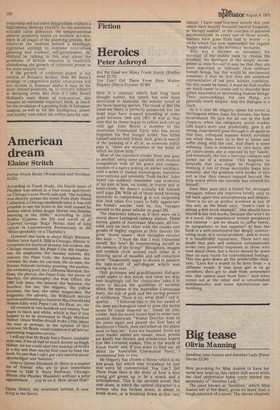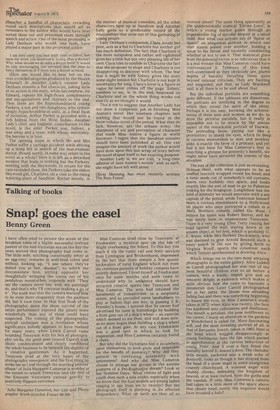Big tease
Olivia Manning
Sanditon Jane Austen and Another Lady (Peter Davies £3.50) How provoking for Miss Austen to have her name writ large on this rather dull novel while the chief perpetrator hides coyly behind the anonymity of "Another Lady."
The piece known as 'Sanditon,' which Miss Austen left at her death, gives no more than a rough intention of a novel. The eleven chapters
&catcher a handful of characters, crowding round each descriptions that would act as reminders to the author who would have later sorted them out and presented them through speech and action. One of the most promising is Lady Denham who would, one feels, have played a major part in the projected action: I am very sorry you met with your accident, but Upon my word, you deserved it. Going after a doctor? Why, what should we do with a doctor here? It would be only encouraging our servants and the poor to fancy themselves ill if there was a doctor at hand.
, (How one would like to hear her on the over-crowded surgeries produced by the Health Scheme!) In Another Lady's version Lady Denham remains a flat character, taking little or no action in the story, while her nephew, Sir Edward, repeats his high-flown compliments and mis-quotations and chatters to the end. Then there are the hypochondriacal young Parkers, a son and two daughters, who remain simply hypochrondriacal until, in a final flash of invention, Arthur Parker is provided with a rich heiress from the West Indies. Another Lady's chief, and happiest, contribution to the novel, is the elder Parker son, Sidney, a tear-away and a tease, with whom, inevitably, the heroine is in love.
The opening scene in which Mr and Mrs Parker suffer a carriage accident while driving up a steep hill in search of the non-existent doctor, should, surely, in some way relate to the novel as a whole? Here it is left as a detached incident that leads to nothing but the Parkers' meeting with the Heywoods. In return for the care extended them, the Parkers take the eldest Heywood girl, Charlotte, on a visit to the rising watering-place of Sanditon. Rather lamely, in the manner of musical comedies, all the other characters turn up at Sanditon and Another Lady gives us a predictable record of the relationshipsThat arise out of this gathering of young people.
Lady Denham's companion, Clara, lovely but poor, acts as a foil to Charlotte but neither girl has much definition. The fact that Charlotte is • the more outspoken and rather self-righteous' gives her a little but not very pleasing life of her own. Clara tries to confide in Charlotte the fact that she proposes to elope and Charlotte is too disapproving to discover with whom. The fear that it might be with Sidney gives the story some slight tension but Charlotte is not kept in uncertainty for long. Clara's lover is a figure so vague he never comes off the page. Sidney, needless to say, is, in the end, bestowed on Charlotte and so the whole thing works out exactly as we thought it would.
This is not to suggest that Another Lady has not done a competent job in finishing Miss Austen's novel. Her nineteen chapters lack nothing that would not be found in the three-volume novel of the period. What they do lack, however, are the urbane irony, the sharpness of wit and perception of character that made Miss Austen a figure in world literature. I regret that the Sanditon remains should have been published at all. One can imagine the amount of work the author would have done upon this last scrap of ivory before the novel shaped itself to her exacting purpose.
Another Lady is, we are told, long-time admirer of Jane Austen's novels" and, as such, she might have left well alone.
Olivia Manning has most recently written. The Rain Forest



































 Previous page
Previous page